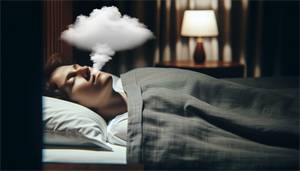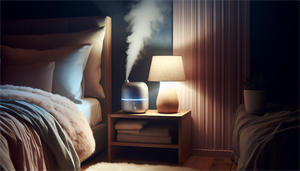Are you or your partner struggling with snoring? Are you tired of those sleepless nights filled with the sound of loud snoring?
Well, you’re not alone. Millions of people worldwide face the same battle every night, compromising their sleep quality, causing resentment, and potentially leading to health issues.
But, what if there is a way to combat this nightly nuisance? By understanding the causes of snoring and implementing effective strategies on how to stop someone from snoring, you can take control of your nights and finally get that good night’s sleep you deserve.
Snoring doesn’t have to be a life sentence. Let’s explore this together and figure out how we can stop snoring and start sleeping better.
Key Takeaways
-
Understanding the root causes of snoring, including nasal congestion, obesity, alcohol consumption, sleeping position, age, and smoking, is key to finding effective solutions and improving sleep quality.
-
Simple lifestyle changes, such as weight loss, reduced alcohol intake, and establishing a regular sleep routine can make a significant difference in alleviating snoring.
-
Various sleep position adjustments and anti-snoring devices, including side sleeping, wedge pillows, and oral appliances, can help open up airways and reduce snoring.
Understanding the Causes of Snoring

Snoring is more than just an annoying snoring noise that keeps you or your partner awake at night. It’s a signal from your body indicating an obstruction in your throat or nasal airway, disrupting your breathing during sleep. It’s like your body’s alarm clock, but instead of waking you up gently, it’s more like a blaring siren.
Are you aware that if snoring is a symptom of a sleep disorder like sleep apnea, it can cause sleep deprivation and other health problems such as high blood pressure and heart disease? So, understanding the root causes of snoring is the first step towards finding an effective solution and improving your sleep quality.
Some common causes of snoring include:
-
Nasal congestion
-
Obesity
-
Alcohol consumption
-
Sleeping position
-
Age
-
Smoking
By identifying the underlying cause of your snoring, you can take appropriate measures to address it and enjoy a better night’s sleep.
Obesity and Snoring
Have you ever questioned the sudden onset of your snoring? One of the reasons might be weight gain. Obesity contributes to snoring by causing the presence of excess soft tissue in the mouth and throat, which can obstruct the airway during sleep. It’s like trying to breathe through a narrow tube, the air struggles to pass through, creating that infamous snoring sound.
Studies have shown a correlation between obesity and snoring, with excess weight leading to increased pressure on your airways, resulting in various respiratory issues. So, if you’ve noticed an increase in your snoring along with a few extra pounds, it might be time to consider a weight loss plan.
Sleep Position and Snoring
Sleep positions deserve our attention. Do you usually sleep on your back, stomach, or side? Believe it or not, your sleep position plays a crucial role in whether you snore or not. When you sleep flat on your back, it can exacerbate snoring. Why? Because gravity pulls your tongue and soft tissues at the back of your throat downward, blocking your airway. This can lead to the vibrations that we know as snoring.
On the other hand, side sleeping can help alleviate snoring by preventing your tongue from blocking your airway and keeping your nasal passages open. Thus, changing your sleep position might be a simple yet effective solution to your snoring problem.
Alcohol Consumption and Snoring
Alcohol is another frequent cause of snoring. Yes, that glass of wine or bottle of beer before bed might be the reason behind your snoring problem. Alcohol acts as a muscle relaxant, causing your throat muscles to relax more than usual during sleep, which can lead to snoring.
This means that the more you drink, especially before bed, the more likely you are to snore. So, if you’re looking to reduce your snoring, it’s advisable to refrain from consuming alcohol at least 4 hours before going to bed.
Simple Lifestyle Changes to Reduce Snoring

Having identified the potential causes of snoring, it’s time to discuss some simple lifestyle modifications that can help alleviate snoring. These include losing weight, reducing alcohol intake, and establishing a regular sleep routine. These strategies are easy to implement and can have a significant impact on your snoring problem.
It’s like hitting the ‘reset’ button on your sleep habits. And the best part? You can start making these changes today.
Weight Loss and Snoring
Starting with weight loss, losing a few pounds can significantly reduce or even eliminate snoring. When you lose weight, you reduce the fatty tissue in your throat that might be causing your airway obstruction. In fact, studies have shown that even a modest weight loss can lead to substantial improvements in snoring. It’s like clearing a blocked pipe, allowing the air to flow freely again.
So, if you’re overweight and snoring, weight loss might be an effective solution for you.
Alcohol and Sleep
Reducing alcohol intake can also help in preventing snoring. As we mentioned earlier, alcohol relaxes your throat muscles, increasing the likelihood of snoring. This effect is especially pronounced if you consume alcohol close to bedtime. So, it’s a good idea to avoid alcoholic drinks for at least 4 hours before you hit the sack.
This small change can make a big difference in helping you stop someone from snoring and stop snoring yourself.
Establishing a Sleep Routine
Lastly, establishing a regular sleep routine can help reduce snoring. When you go to bed and wake up at the same time every day, it helps regulate your body’s internal clock, promoting better sleep quality. Plus, a consistent sleep schedule can help prevent nasal congestion, which is a common contributor to snoring.
So, try to set a regular bedtime and wake-up time, and stick to it as closely as possible, even on weekends.
Optimal Sleep Positions for Snorers

In addition to lifestyle changes, adjusting your sleep position can also help reduce snoring. As we discussed earlier, certain sleep positions like sleeping on your back can worsen snoring, while others like side sleeping can help alleviate it. But there are also other techniques you can use to improve your sleep position and reduce snoring, such as using a wedge pillow or elevating your head.
We should examine each of these strategies in detail.
Side Sleeping
Side sleeping is often recommended as a simple and effective way to reduce snoring. By sleeping on your side, you prevent your tongue and throat tissues from blocking your airway, which helps reduce snoring. However, it might be challenging to maintain this position throughout the night.
In such a case, you can try using a body pillow or even sewing a tennis ball into the back of your pajama top to discourage rolling onto your back and potentially causing neck pain.
Using a Wedge Pillow
A wedge pillow can be highly effective in reducing snoring. It’s designed to:
-
Elevate your upper body
-
Align your airways
-
Improve airflow
-
Reduce snoring
Moreover, it can also prevent conditions like acid reflux, which can contribute to snoring.
So, if you’re struggling with snoring, a wedge pillow might be worth considering.
Head Elevation Techniques
Similarly, elevating your head can also help reduce snoring. Elevation helps open up your airways, preventing the downward collapse of throat muscles and reducing the risk of airway blockage, which ultimately reduces snoring. You can achieve this by using an adjustable bed, a specially designed ‘anti-snore’ pillow, or even by propping up your head with an extra pillow.
Anti-Snoring Devices and Their Effectiveness

If lifestyle changes and adjustments in sleep positions don’t seem to help, you might want to consider trying anti-snoring devices. These devices, such as nasal strips, chin straps, and oral appliances, are specifically designed to address the physical causes of snoring. They work by improving airflow, reducing airway obstruction, or changing the position of your jaw or tongue.
We should further examine how each of these devices operates.
Nasal Strips
Nasal strips are small adhesive strips that you stick on the bridge of your nose. They work by gently pulling your nostrils apart, which opens up your nasal airway passages and enhances airflow. This can help reduce snoring, especially if it’s due to a problem in your nose, like nasal congestion.
Nasal strips are easy to use, non-invasive, and can be bought over-the-counter, making them a popular choice for many snorers.
Chin Straps
Chin straps are another anti-snoring device that can be effective for some people. They work by keeping your mouth closed and encouraging you to breathe through your nose, reducing snoring. However, they may not be suitable for everyone, especially if you have nasal congestion or if you naturally breathe through your mouth when you sleep.
Oral Appliances
Oral appliances are devices that you wear in your mouth while you sleep. They work by repositioning your jaw and tongue, improving airflow and reducing snoring. Oral appliances are usually custom-made by a dentist or a sleep specialist and can be highly effective, although they may take some time to get used to.
Sleep Environment Modifications for Snorers

Last but not least, modifying your sleep environment can also help reduce snoring. This can include using a humidifier in your bedroom to soothe airways and prevent a dry mouth or sore throat, or maintaining an allergen-free bedroom to minimize congestion and allergic reactions that can lead to snoring.
We should examine each of these strategies in detail.
Humidifiers and Snoring
Humidifiers add moisture to the air, which can soothe your airways and prevent them from drying out, reducing snoring. They can also act as an air filter, removing allergens that may contribute to snoring.
So, if you live in a dry climate or if your snoring is worse in the winter months when the air is dry, a humidifier might be worth considering.
Allergen-Free Bedrooms
Keeping your bedroom free from allergens can also help reduce snoring by minimizing congestion and allergic reactions. This includes allergens like dust mites, pollen, and pet dander, which can irritate your airways and cause congestion.
You can keep your bedroom allergen-free by regularly vacuuming, using hypoallergenic bedding, and applying dust-proof covers on your mattresses and pillows.
When to Seek Professional Help for Snoring
While lifestyle changes, sleep position adjustments, and anti-snoring devices can all be effective in reducing snoring, it’s important to recognize when it’s time to seek professional help. If you notice symptoms of sleep apnea, such as excessive daytime sleepiness or gasping for air during sleep, or if your snoring persists despite trying various strategies, it might be time to consult a sleep specialist.
Recognizing Sleep Apnea Symptoms
Sleep apnea, specifically obstructive sleep apnea, is a serious sleep disorder that can lead to snoring due to interruptions in breathing during sleep. Symptoms of sleep apnea include daytime fatigue, loud snoring, and waking up gasping or choking. If you’re experiencing these symptoms along with your snoring, it’s important to consult a doctor as soon as possible.
Consulting a Sleep Specialist
A sleep specialist can help diagnose the underlying causes of your snoring and recommend suitable treatment options. They may use a sleep study or other tests to assess the severity of your snoring and check for conditions like sleep apnea.
Treatment options may include lifestyle adjustments, oral appliances, or even surgical procedures, depending on your specific needs.
Coping Strategies for Partners of Snorers
If your partner’s snoring is keeping you awake at night, we empathize with your predicament. The constant noise can make it difficult for you to fall asleep or stay asleep, leading to sleep deprivation and potentially contributing to sleep disorders.
But don’t worry, there are several coping strategies that you can try, such as using earplugs, white noise machines, and practicing good sleep hygiene at a sleep clinic.
Earplugs for Better Sleep
Earplugs are a simple yet effective solution for blocking out the noise of snoring. They can help you sleep better by reducing the sound levels in your environment. However, it’s important to find earplugs that are comfortable to wear and that effectively block out the noise of snoring.
White Noise Machines
White noise machines, including the popular white noise machine, can also be helpful for partners of snorers. They work by generating a steady and calming sound that masks the noise of snoring, allowing you to sleep peacefully. Plus, white noise machines can also help you fall asleep faster and stay asleep longer, improving your overall sleep quality.
Sleep Hygiene Practices
Practicing good sleep hygiene can also help you achieve a good night’s sleep, even if your partner snores. This includes maintaining a consistent sleep schedule, creating a relaxing bedtime routine, and making your sleep environment as comfortable as possible.
By taking care of your own sleep needs, you can ensure that you get enough sleep, even if your partner’s snoring keeps you up at night.
Summary
In conclusion, snoring is a common problem that can disrupt your sleep and affect your overall health. But by understanding the causes of snoring and implementing effective strategies to stop it, you can take control of your nights and finally get a good night’s sleep. Remember, it’s important to try different strategies and see what works best for you, as everyone is different. And if your snoring persists despite trying various strategies, don’t hesitate to seek professional help. Remember, sleep is vital for your health and well-being, so don’t let snoring stand in your way. It’s time to take control of your sleep and start waking up refreshed and ready to take on the day!
Frequently Asked Questions
How do you stop someone else snoring?
Encourage the person to sleep on their side or with their head elevated using a special wedge pillow or by raising the front legs of the bed.
What can a person do to stop snoring?
To stop snoring, a person can try sleeping on their side, using nasal strips, practicing mouth exercises, quitting smoking, avoiding alcohol, and considering weight loss or a mouthpiece. Surgery should be a last resort.
Why do people snore so loud?
People snore loudly because when they sleep, the muscles in the throat relax and partially block the airway, causing vibration and forceful airflow. This can be a sign of obstructive sleep apnea, which is a serious risk factor for cardiovascular disease.
What causes snoring?
Snoring is caused by an obstruction in the nose or throat that partially blocks breathing during sleep, which can be due to relaxed tissues in the throat or physical structures like large tonsils or a deviated septum.
How can weight loss help in reducing snoring?
Losing weight can reduce fatty tissue in the throat, improving airflow and potentially eliminating snoring.


